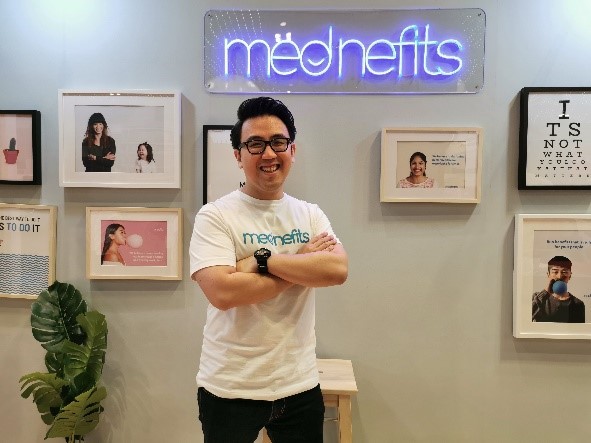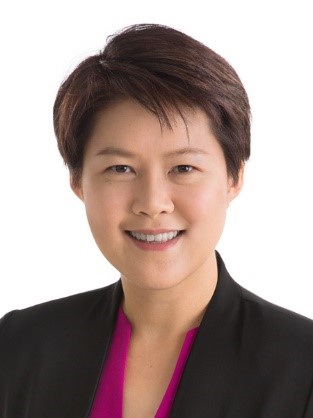Part of adjusting to the new normal involves how companies can continue to meet the evolving needs of their workforces whether they are in the office or working remotely. Even before the pandemic, studies showed that for every $1 invested in workplace adjustments centred on wellbeing, a company was able to generate $5.60 in returns. The challenge that organisations must now face head-on is in offering the right working arrangements, programmes, and employee benefits, for the times we live in, so that they can continue to keep their workforces engaged in the long-run.
SMEHorizon speaks to Mr Chris Teo, Chief Executive Officer, Mednefits — a Singapore-based employee benefits start-up that is seeking to tackle this issue by helping organisations offer the flexibility to cater to evolving needs of employees — and Ms Chin Wei Jia, Group Chief Executive Officer, HMI Group. HMI Group is both a customer and a healthcare provider with Mednefits, with a presence spanning Singapore and Malaysia.

Employees’ changing expectations: not just workers, but human beings.
According to Mr Teo, employee needs have continued to evolve in tandem with changing expectations — not just as workers, but as human beings.
“For most workers, a job is not just a means to an end anymore but has become an avenue of fulfilment, he continues. “47% of SMEs surveyed in a recent study saw strong revenue growth, when they prioritised providing meaningful work experiences for their employees.
“Whether it has to do with rethinking workspaces, developing a more conducive work culture, or incorporating the right technology to improve processes and workflows, it is the companies that take a proactive approach to managing their employees’ needs that usually see the most positive outcomes.

These are relevant to employee needs in the healthcare field as well. Ms Chin shares that as a healthcare services group, HMI Group believes that the foundation to improving patient experience is in first providing a great employee experience.
“Giving patient care can be an emotionally taxing job. It is thus important, especially for frontline employees, to know that even as they do their utmost to care for our patients, that HMI ensures that their own health and wellness are well taken care of.
“A practical example of this concept in action: ensuring employees on shift-work have access to round-the-clock healthcare. Incorporating the right employee benefits platform has gone a long way in allowing our employees to conveniently find the care they need, when they need it.”
Staying sensitive and responsive to employee situations
According to Mr Teo, ways that companies can stay in tune with the needs of workers, include cultivating a robust mentorship programme to help both management and employees better understand how each other’s needs are changing. “Companies can also expand their employee benefits policies, by providing other avenues in which employees can seek assistance for any personal or work-related problems,” he adds.
“In Singapore, for instance, more companies are adopting an Employee Assistance Programme (EAP) as part of their employee benefits. EAPs provide access to individual counselling sessions with trained professionals, and other services such as mental health workshops.
“This is in line with a recent study conducted across Asia Pacific, which found that 38 percent of employers are planning to enhance mental health services and stress management offerings.
However, he stresses that “each organisation is different, and the changes that they enact should be in line with what their employees desire the most.”
Digitalisation to improve HR processes
Digitalisation can help. Says Mr Teo, “pre-COVID, 81% of SMEs believed they needed to digitise more of their workflows to get more work done. Beyond automating tasks, like claims processing, that are resource-intensive, digitalisation affords SMEs the agility and flexibility to help drive the behavioural changes needed in a pandemic world.
“For instance, companies might need to rework how they manage their employee benefits programmes in light of evolving employee needs, especially if remote working becomes a norm. Finding the right, digitally-driven platform can go a long way in managing this process efficiently.
Recognising this was one of the impetus for founding Mednefits. Says Mr Teo, “Mednefits was founded after we realised that small businesses are not always able to access fundamental services like quality, affordable employee benefits. Leveraging the right technology to build our fully digital platform has allowed us to bridge this gap.”
HMI Group has experienced some of these benefits first hand. Shares Ms Chin, “before we worked with Mednefits, employees found it challenging to plan and manage their personal healthcare budget. They would typically have to fork out cash upfront for their medical bills, before seeking reimbursement from HMI.”
Some examples of challenges they faced included ensuring that employees understood all the benefits they were entitled to, providing access to healthcare providers when needed, and making sure that employees were able to conveniently locate these providers. “All these challenges cemented our need for a comprehensive, fuss-free benefits platform for all our employees,” says Ms Chin.
Digitalisation, in tandem with Mednefits, offered their employees convenient access to a wide range of health and wellness providers. “For instance, shift workers are now able to easily locate a panel clinic that is open till late, or on the weekends, through the Mednefits app. This gives them the peace of mind knowing that they have 24-hour access to healthcare.”
It has also helped streamline their processes. “Benefits administration can be a rather cumbersome process for both HR professionals and employees putting up claims,” shares Ms Chin. “The HR team is often faced with significant amounts of paperwork when processing claims, while employees often find it troublesome to submit physical claims, may lose physical receipts, or simply miss the deadline to submit their claims.
‘By working with Mednefits, HMI has successfully simplified the claim process. Employees are now able to easily submit claims, and even pay through the Mednefits app. The HR team can also able to better track claims, and have access to real-time data on employee benefits usage, saving time that would otherwise be spent on manually gathering this information.”
Maintaining welfare during the pandemic
As in many sectors and aspects of business, the pandemic has hastened trends and changes that were occurring before. Mr Teo shares that the aforementioned change in employee expectations have hastened as greater focus is placed on maintaining emotional, mental, and physical health. “The employee experience of today is moving into uncharted territory — where the lines between professional and personal lives are increasingly blurry, and the strains that come with each, are compounded,” he says.
“Many companies are grappling with the challenge of managing employees that are being stretched thin by the disruption to their working and personal lives. Leaders need to appreciate this situation if they are to make informed decisions on how they can improve the welfare of their workers.”
Remote working, in particular, has changed the way companies deal with employee needs. “Unable to interact in an office setting, workers have lost the most consistent form of connection to their peers and managers,” says Mr Teo. “Beyond that, there also lies the challenge of adapting to a completely different work environment — where they might have kids to take care of, families to cook for, or other home duties to tend to — while delivering the same standard of work as when in the office.
“Remote working calls for elevated levels of trust and communication between all members of the company, especially for SMEs with tightly-knit teams that rely on each other to fulfil multiple roles and functions.
“Companies need to expend more effort into providing employees with the tools and the space required to bring their best selves to work in these different circumstances, for example establishing regular outlets of communication through video conferencing or calls.
Staying responsive to the changes wrought in these times, HMI Group has focused its attention on keeping them safe, engaged, and committed to the organization’s mission, values, and goals.
“For instance, we awarded a special bonus to our hospital-based employees for their efforts in our battle against COVID-19, showing our appreciation and support in a tangible way,” says Ms Chin. “We offer employees and their family members healthy and heavily-discounted staff meals. In addition, we offer employees the possibility to receive vaccinations at the workplace, or through a designated medical facility to reduce absences and productivity losses associated with common illnesses.
“At the same time, we are also making preventive health more accessible by providing all staff with complimentary basic health screening services. Mednefits has played an instrumental role in helping us enact these policy changes during the pandemic, reducing the administrative burden to specify, manage and keep track of employee medical benefits in line with these new and enhanced entitlements.”
Beyond the pandemic, HMI Group is seeking to further engage and empower employees across multiple generations while attracting and retaining talent via managed care. “In particular,” adds Ms Chin, “we are looking at strengthening our support for young working mothers, and providing employees who have to look after elderly family members with care-giving tips.”
Digitalising beyond employee needs
Beyond the need to meet employee expectations of being treated like human beings, digitalisation continues to update other aspects of business as well. Ms Chin shares that HMI Group has been implementing digitalisation programmes that are patient-centric, can sustainably reduce costs, and can improve internal communications.
“We are working to introduce smart healthcare technologies in our facilities in Singapore and Malaysia. One recent project involves deploying UV-light autonomous disinfecting bots in our hospitals in Malaysia,” she concludes.














